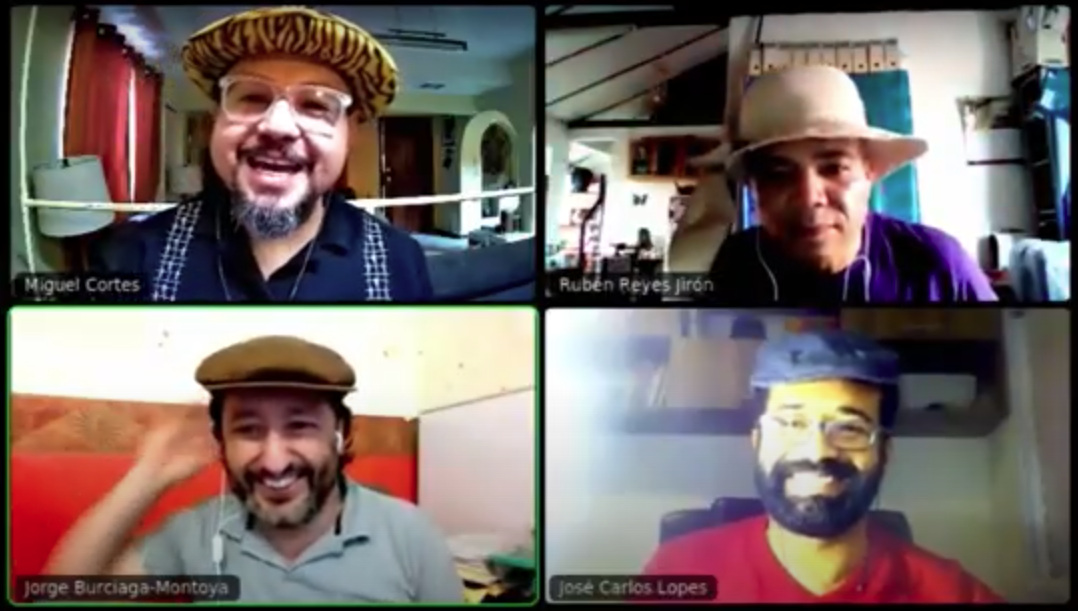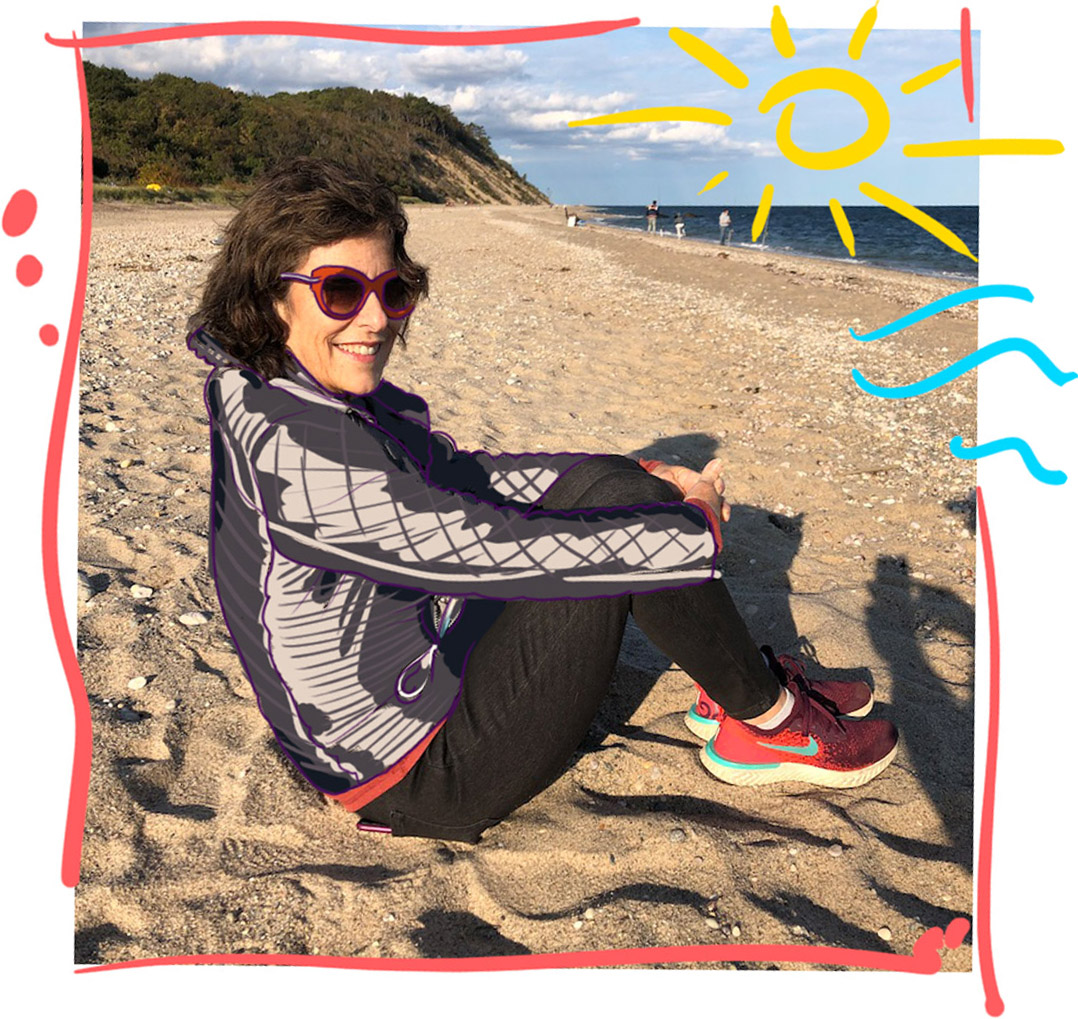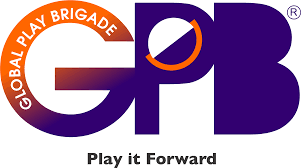Playing With Masculinity and Gender Roles

Miguel Cortés, Rubén Reyes Jirón, Jorge Burciaga-Montoya, and José Carlos Lopes facilitate Juegos de Hombres.
The man who does not play has lost forever the child
who lived in him and who he will miss terribly.
Pablo Neruda
who lived in him and who he will miss terribly.
Pablo Neruda
“Who, like me, has ever harassed a woman?” When I first heard about the workshop series that the Global Play Brigade’s Latin American contingent (GPB Latino América) was planning, I could barely contain my excitement about using the power of play to look at, challenge, and perform beyond masculinity.
Jorge Burciaga-Montoya and Miguel Cortés (Juárez, Mexico) facilitate this gender-disrupting workshop along with José “Ze” Carlos Lopes (São Paulo, Brazil) and Rubén Reyes Jirón (Managua, Nicaragua). These four performance activists, educators, therapists and co-founders of the Global Play Brigade lead an online workshop series called Juegos de Hombres (“Men’s Games”). These sessions use playful games to support men to explore the meaning of masculinity and to re-examine gender roles and cultural assumptions.
¿Puedes jugar con ser un matón? (Can you play with being a bully?)
One of the games they play is “burling,” which is a Spanish/English melding of “bullying” and “taunting.” Participants are directed to give each other compliments like, “You look so handsome today,” while using a mean or threatening tone. For example, “You are doing such a great job leading this workshop! How dare you do such a good job!” They get to perform in a stereotypical masculine and macho way while saying things they don’t usually have the freedom to say as men – giving one another compliments, being warm, and expressing appreciation. One of the participants said that he had never considered the possibility or importance of someone saying positive things about him before playing this game.
¿Quién como yo? (Who, like me?)
Using their hands to block or unblock the camera on Zoom, the men in the first workshops – participants from nine countries across Latin America – shared their different or similar experiences:
Who, like me, has ever harassed a woman?
Who, like me, has thought that because you have a certain amount of money, you were more powerful than others?
Who, like me, has been bullied because you decided not to fight on the street?
Who has protected a woman?
Who has respected a woman?
Who has seen women harassed and not known what to do?
Cover your camera if you, like me, have experienced the same.
The intergenerational participants felt comfortable to share their history and how they too have been socialized to be men. As the games created room for reflection, one of the participants said, “We need to question what society is telling us to be, because we don’t want to be that.”
In designing a space for playing with these issues, they had created an environment where non-defensive, open conversation and exploration could happen. By playing together, they were able to talk about the personal harm that culture, assumptions, and roles have caused them, as well as the damage it has on women and children. Together, they played with and talked about how they view, behave, and embrace those cultural traits. Many of the men shared that they were happy, surprised, and relieved to share those feelings and listen to the issues that other men deal with. People didn’t want the session to end and hung around after the scheduled closing time. One of the younger participants stayed on the Zoom call as he was traveling to work and even after he arrived because he didn’t want to miss anything.
I am heartened to share that these vital sessions are not ending. Several more workshops are planned, including some where women are invited to join. These workshops are called Juegos Genero-sos (“Gender/Generosity Games”). “Genero-sos” is a delightful play-on-words that mixes “gender” and “generosity” – language that helps us play with and explore the concept of identity. In a world where we are being divided and polarized in more and more ways, play gives us a way to explore and work with – rather than cancel or shame – each other. We need play for when we make mistakes, have differences of opinion, and experience our myriad of human differences (the good, the bad, the ugly, and all of the gray areas in between). Play is a vital and creative tool that helps us to grow and learn together, in between, around, and outside of our socially constructed identities.
The great Chilean poet Pablo Neruda reminds us of the importance of not forgetting to play. José, Miguel, Rubén, Jorge, and the entire Global Play Brigade Latino América team are building spaces so that we can play. They are leading the way by supporting men (and women) to break societal rules and roles by creating new, humane, and loving performances together.
Something cool…
At the end of each of my blogs I share a neat thing I found (or a friend sent me). Today’s site is all about word-smithery. Inspired by Pablo Neruda to create your own poetry? Try this poem generator to get the ball rolling.
September 7, 2021

Cathy Salit is a performance activist, social entrepreneur, executive coach, funny lady, and jazz singer. She used to be the CEO of the leadership consultancy Performance of a Lifetime. She wrote a book. She chats with interesting people. These days, she’s leading the Global Play Brigade — bringing play and emotional support to thousands across the planet, while maintaining a small coaching practice, speaking, and leading workshops. Cathy has two cats named Belle and Benny who like to walk across her laptop when she is doing brilliant and paradigm-shattering work.
Inbox not full enough yet?
Subscribe here for my latest blogs, exciting news, neat things, and special invitations.


Thank you, CRS, for this blog and for these 4 progressive men leading and stepping out and away from their societal and cultural and gender identity. I love it!! and that it will continue…. Jill B
They, and this work is truly inspiring! Thanks for your note, Jill.
Juegos Genero-sos (“Gender/Generosity Games”)! How cool! The offerings of these open hearted facilitators are lifting my spirits! Thank you for sharing this.
Thanks, Gwen. I think they are lifting many people’s spirits with their beautiful work.